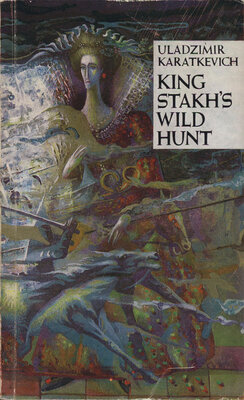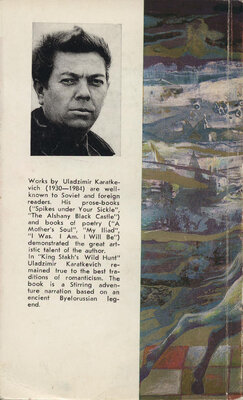King Stakh's Wild Hunt
Уладзімір Караткевіч
Выдавец: Мастацкая літаратура
Памер: 248с.
Мінск 1989
No moral criteria could help. I trembled like an aspen leaf and fell asleep entirely weakened by fear. If the steps of the Little Man were heard that evening, I’d in all probability have hidden under the bed, but luckily that did not happen.
The morning brought me courage. I was calm.
I decided to go to Berman that day, all the more so that our mistress was still ill. Behind the house grew enormous burdock. It was already taller than a man and drying up. I made my way through it, reached the porch and
knocked at the door. Nobody answered. I pulled at the door and it opened. The small ante-room was empty, only Berman’s coat was hanging there. I coughed. There was a rustling of something in the room. I knocked — Berman spoke in a broken voice:
“Who, who’s there? Come in!”
I entered. Berman got up from behind the table, wrapped his dressing-gown tighter about him. His face was pale.
“Good afternoon, Mr. Berman.”
“S-sit down, sit down, please,” and he began fussing about to such an extent it made me feel uncomfortable.
“Why have I come dragging myself here? A person likes his solitude. Just look how alarmed he is...”
But Berman had already taken himself in hand.
“Take a seat, Honourable Sir. Be seated, please.”
I looked at the armchair and saw a plate on it. Some unfinished food in it and a spoon. Berman quickly removed everything.
“I beg your pardon, 1 had decided, how shall I put it?... to satisfy my appetite.”
“But, please, go on eating,” I said.
“Oh! Unthinkable! To eat in the presence of a highly respected gentleman. I just... could not.”
The lips of this porcelain doll pleasantly rounded out.
“Have you never noticed what an unpleasant sight is a person eating? Oh! It’s awful! He chews dully, and reminds one of cattle. There is a striking resemblance in all people to some kind of animal. This one guzzles like a lion, that one champs, I beg your pardon, like the animal
the prodigal son pastured. No, my dear sir, I never eat in the presence of anybody.”
I took a seat. The room was furnished very modestly. An iron bed, reminding one of the guillotine, a dinner-table, two chairs, another table with books and papers piled on it. Only the table-cloth on the first table was unusual, a very heavy one, blue and golden, hanging down to the very floor.
“You are surprised, aren’t you? Oh! Honourable Sir, it’s the only thing that has remained from former times.”
“Mr. Berman...”
“I’m listening to you, sir.”
He sat down, bent his doll-like head, opened wide his large grey eyes and raised his eyebrows.
“I want to ask you whether you haven’t any other plans of this house?”
“M-m-no. There is one more, made about 30 years ago, but it’s plainly stated there that it is a copy of the one that I gave you, and only some new partitions are indicated. This is it. Take it, please.”
I examined the paper. Berman was right.
“But tell me, isn’t there any hidden room on the second floor near the room with an empty closet?”
Berman thought awhile. “I don’t know, Respected Sir, I don’t know, Sir. There must be a personal secret archive of the Yanowskys somewhere, but where it is, I do not know.”
His fingers were moving quickly across the table-cloth, knocking out some kind of a march that I could not understand.
I stood up, thanked him and left.
“What had frightened him so?” I thought.
“His fingers beating away, his white face! This devil of a bachelor has begun to fear people...”
And, however, an obtrusive thought continued to drill my brain.
“Why? Why? There’s some dirty business going on here. And why does the word ‘hands’ keep whirling in my brain? Hands, hands. What is connected here with hands? There must be something hidden in this word, if it so persistently repeats itself in my subconsciousness”.
I left him firmly convinced it was necessary to be very watchful. I didn’t like this doll-like man and especially his fingers, which were twice as long as normal ones and wriggled on the table like snakes.
CHAPTER THE EIGHTH
The day was grey and gloomy, such an indifferent grey day, that I wanted to cry on my way to the estate belonging to the Kulshas. Low grey clouds were creeping over the peat-bogs. The landscape lay before me looking like a monotonous barrack. Grey spots were moving about here and there on the smooth brown surface of the plain: a shepherd was grazing sheep there. I walked along the edge of the Giant’s Gap, and there was no place, literally, for the eye to rest on. Something dark lay in the grass. I came up closer. It was an enormous stone cross about three metres long. It was knocked down long ago, for the hole in which it had stood was almost level with the ground and was covered with undergrowth. The letters on the cross were hardly visible:
“God’s slave, Roman, died a quick death here. People wandering by, pray for his soul, so that someone should pray for yours, because it
is your prayers that are especially to God’s liking.”
I stood long near it. So this is where Roman the Elder perished!
“Sir, kind sir,” I heard a voice behind my back.
I turned around. A woman in fantastic rags was standing behind me with a hand outstretched. Young she was and quite pretty, but her face with its yellow skin was so frightful that I lowered my eyes. In her arms lay a child.
I gave her some money.
“Perhaps the gentleman has at least a tiny piece of bread? I’m afraid I won’t be able to reach my place. And Yasik is dying...”
■ “But what’s wrong with him?”
“I don’t know,” she answered tonelessly.
I found a sweet in my pocket and gave it to the woman, but the baby remained indifferent to it.
“Then what shall I do with you, my poor one?”
A peasant was riding along the road in a cart driven by a bull. I called to him, took out a rouble and asked him to take the woman to Marsh Firs, she should be fed there and given shelter.
“May God give you health, sir,” the woman whispered, in tears. “Nobody anywhere has given us anything to eat. May God punish those who drive people from the land!”
“And who drove you off?”
“A gentleman.”
“What gentleman?”
“The gentleman, Antos. Such a skinny one he is...”
“But what’s his surname? Where’s your village?”
“I don’t know his surname, but the village is here, behind the forest. A good village. We had some money even, five roubles. But they drove us away.”
Her eyes expressed wonder: why didn’t the owner take the five roubles, why did he drive them away?
“And where is your husband?”
“They killed him.”
“Who killed him?”
“We screamed, wept, didn’t want to go away. Yazep also screamed. Then they shot him. And at night came the Wild Hunt and drowned those who screamed the loudest. They disappeared... Nobody screamed any more.”
I hastened to send them off, and myself walked on, desperate beyond description. God, what darkness! What oppression! How to move the mountain? At Dubatowk’s we had guzzled so much it would have been sufficient to save the lives of forty Yasiks. The hungry man is not given any bread, his bread is given to the soldier who’ll shoot at him since he is hungry. State wisdom! And these unfortunates keep silent! For what sins are you, my people, being chastised, why, on your own native land, are you stormily driven here and there like autumn foliage? What forbidden apple did the first Adam of my tribe eat?
Some guzzled more food than they could possibly eat, others died of hunger under their windows. This broken-down cross here over him who lived on the fat of the land, and here a child dying of hunger.
This boundary has existed for ages between the one and the other,— and this is the end, a logical completion, a running wild; throughout the entire state there is gloom, dull fright,
hunger, madness. And all Byelorussia — a common battlefield for the dead over which the wind howls, dung under the hoofs of contented fat cattle.
Wanderers will not pray for you, Roman the Elder. Every man shall spit on your fallen cross. And may God give me strength to save the last one of your kin, she who is innocent of any crime against the inexorable truth of our stepmother, our Byelorussia.
Is my people really such a forgotten, such a dead nation?
I spent about forty minutes making my way through the damp forest behind the Giant’s Gap and reached the narrow path covered with brushwood. Along both sides of the road stood aspens, their leaves were falling. Birches stood out in the midst of this crimson mass, birches that had already turned yellow, and oaks that were yet quite green. A small path led down into a ravine with a murmuring brook, its water the colour of strong tea. The banks of the brook were covered with soft green moss and connected by green bridges made of the trees that had been broken down by storms. It was along these tree-trunks — on some of which the moss was stripped off — that people crossed the brook.
All around was silent and solitary. No people anywhere. In tree-tops sounded the chirping of a tiny bird, and hanging down from the cobwebs among the trees were lonely leaves that had got caught falling down from the branches. Floating about in the brook were tiny red and yellow, sad leaf-boats, but in one place there was a small pool in which they whirled about as if they were being cooked there by a water-sprite for its supper. In order to cross the
brook I had to break down a rather thick, but quite dry aspen to support me, and I broke it down with one kick of my foot.
Behind the ravine the forest became dense. The path disappeard in an impassable thicket. It was surrounded by jungles of raspberrycanes, dry stinging-nettle, wild blackberries and other weeds. Hops climbed the trees like green flames, twined about them, hung down from them in sheaves that caught onto my head. There soon appeared the first signs of human life: bushes of wild lilac, squares of fertilized soil (former flower-beds), man’s fellow-traveller — tall burdock. The lilac thickets were so dense that I could hardly get out of them and onto a small clearing in which a house stood safely hidden. It was built on a high stone foundation with a wing made of bricks. The wooden columns there had most likely been painted white in the lifetime of their grandfathers; it leaned over on one side, and as a man fatally wounded is about to fall, so was this house. Twisted platbands, boarding torn down, glass grown opalescent with age. Burdock, marigold, oleander in between the steps of the front wing almost blocking the way to the door. And on the way to the back door a puddle filled with bricks. The roof green, and thick with fat, fluffy moss. I took a look into the house through a little grey window: the inside of the house seemed gloomier and even more neglected. In a word it was a cottage standing on its last legs. Only the witch Baba Yaga was missing, she who should have been lying on the ninth brick, saying, “Fie! I smell the blood of a man!”
 КНІГІ ОНЛАЙН
КНІГІ ОНЛАЙН


